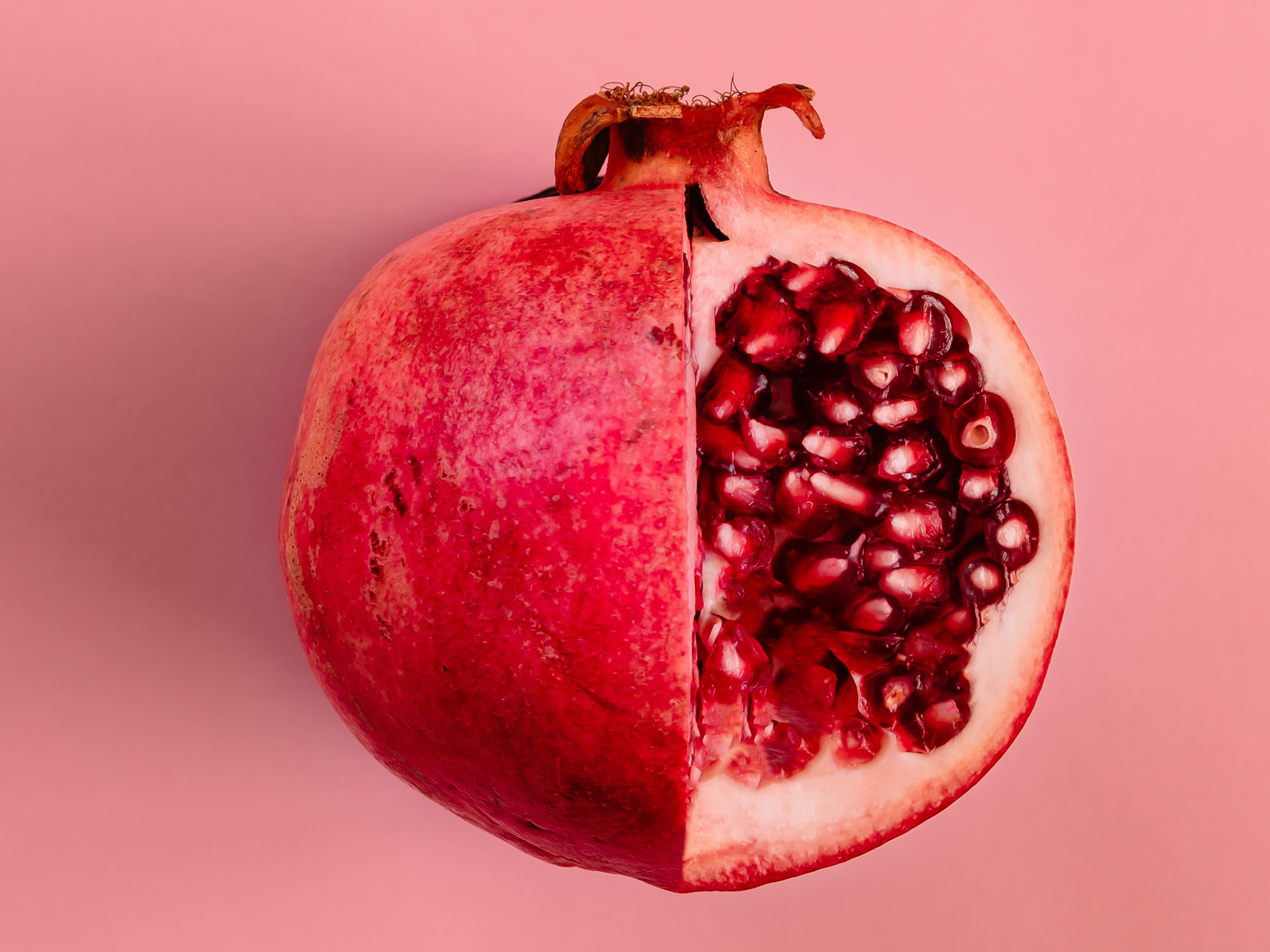Get Easy Health Digest™ in your inbox and don’t miss a thing when you subscribe today. Plus, get the free bonus report, Mother Nature’s Tips, Tricks and Remedies for Cholesterol, Blood Pressure & Blood Sugar as my way of saying welcome to the community!
5 Ways pomegranates heal your body

During my childhood, every fall was marked with a new sweater, a trip to the mountains to see the leaves change… and a pomegranate.
My parents called it a Chinese apple. I don’t think they knew then how amazingly powerful the seeds of this fruit were, but if they had, they would have had us eat even more of them!
Today, we know that this dark red fruit that has been around for thousands of years is one of the most powerful health agents we have at our disposal. The vitamins and nutrients it contains can help ward off the most dreaded diseases we know, and then some.
Here is some background on this amazing fruit plus five reasons you should be eating a lot of them, along with some ideas on how to enjoy them.
The ancient giant berry
The pomegranate’s thick, leathery skin and deep red color give it a rather exotic look. In reality, the pomegranate is classified as a berry, one that’s chock-full of edible seeds (also called arils).
Pomegranates are one of the oldest known fruits. They have been found in Egyptian tombs and symbolize a joyous future in Persian wedding ceremonies. The pomegranate’s origins can be traced back as far as the year 1000 B.C.!
Spanish settlers introduced the pomegranate tree to California in 1769. Today, pomegranates are still mainly cultivated in California, as well as in the dry zones of Arizona.
The antioxidant power of pomegranates
There’s a good reason the pomegranate has been revered and considered special for so long. It holds more healing power than any other fruit out there, particularly due to the huge concentration of antioxidants within its tough skin.
Pomegranate juice has three times more antioxidants than either red wine or green tea. This means it’s a super-powerful inflammation fighter, preventing all sorts of diseases and chronic health conditions.
Here are just five of the ways that pomegranates can heal your body.
- Improves heart health. In one study, a year of drinking pomegranate juice caused patients with atherosclerosis to experience a 27 percent reduction in artery-clogging plaque as opposed to nine percent in the control group that did not drink pomegranate juice.
It is thought that the antioxidants in pomegranate juice lower systolic blood pressure (the top number in your blood pressure reading), slow the formation of arterial plaque and improve blood flow, keeping arteries flexible.
- Reduces cancer risk. In men with prostate cancer, drinking pomegranate juice lengthened the time it took their prostate-specific antigens (PSAs) to rise (higher PSA levels are associated with higher risk of death from prostate cancer).
Pomegranate has also been shown to inhibit the growth of breast cancer cells by inducing apoptosis (cell death).
- Protects against osteoporosis and arthritis. A study in the European Journal of Nutrition found that all parts of the pomegranate – seeds (aril), juice, skin and all – stimulated osteoblast cells (cells responsible for bone growth) and decreased the effects of osteoclast cells (those responsible for bone breakdown).
In another study, pomegranate extract blocked the production of a cartilage-destroying enzyme, leading researchers to comment that pomegranate or its extracts “may be a useful nutritive supplement for maintaining joint integrity and function.”
- Enhances and improves memory. When people with age-associated memory problems drank eight ounces of pomegranate juice daily, they saw significant improvement in verbal memory tests, as well as in their plasma antioxidant levels.
It also appeared that the juice helped encourage blood flow to those areas of the brain responsible for memory-related tasks.
Research also has pointed to pomegranate juice as a possible weapon in beating Alzheimer’s disease. The brains of mice that drank the juice showed a marked decrease in the buildup of amyloid plaques that are known to cause Alzheimer’s.
- Fights bacterial and fungal infections. Extracts of pomegranate seeds and skin inhibit the growth of staph bacteria and E. coli. It also inhibits C. difficile, one of the most difficult-to-treat antibiotic resistant superbugs.
How to eat a pomegranate
Don’t be intimidated by the thick skin or messy seeds. Here’s how to eat a pomegranate in three easy steps:
- Cut off the crown, then cut the fruit into sections
- Place each section in a bowl of water and roll out the arils with your fingers. Discard the rest.
- Strain out the water and enjoy the arils. Some people suck off the fruit and spit out the seed. But the hard seed within is fiber-rich and can be eaten.
Pomegranate is also great added to salads, dressings, yogurt or smoothies.
Editor’s note: Did you know that when you take your body from acid to alkaline you can boost your energy, lose weight, soothe digestion, avoid illness and achieve wellness? Click here to discover The Alkaline Secret to Ultimate Vitality and revive your life today!
Sources:
- Pomegranate use to attenuate bone loss in major musculoskeletal diseases: an evidence-based review — Current Drug Targets
- Pomegranate juice decreases amyloid load and improves behavior in a mouse model of Alzheimer’s disease — Neurobiology of Disease
- Welcome to the World of Pomegranates “The Jewel of Autumn” — Pomegranate Council













